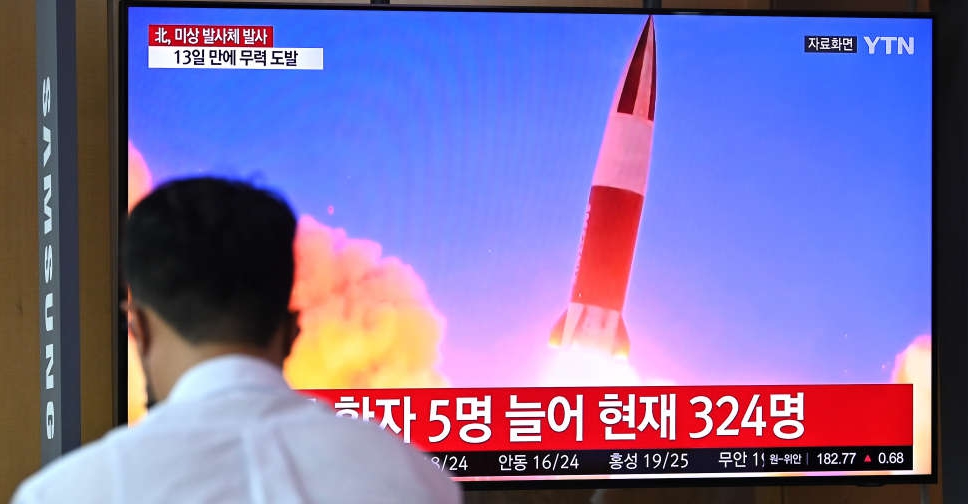
North Korea fired at least one ballistic missile off its east coast on Tuesday, officials in South Korea and Japan said, as Seoul opens a major arms fair.
The North Korean launch would be the latest weapons test by the country, which has pressed ahead with military development in the face of international sanctions imposed over its nuclear weapons and missile programmes.
One ballistic missile was launched about 10:17 am (local time) from the vicinity of Sinpo, South Korea's Joint Chiefs of Staff said, where North Korea keeps submarines as well as equipment for test firing submarine-launched ballistic missiles (SLBMs).
South Korean newspaper Joongang Ilbo cited an unnamed military source as saying the government was "assuming that it was an SLBM test," without elaborating.
North Korea has also launched other types of missiles from that area.
"Our military is closely monitoring the situation and maintaining readiness posture in close cooperation with the United States, to prepare for possible additional launches," JCS said in a statement.
Japanese Prime Minister Fumio Kishida said that two ballistic missiles had been detected, and that it was "regrettable" that North Korea had conducted a string of missile tests in recent weeks.
There was no immediate explanation from South Korea's JCS for the conflicting number of missiles detected.
South Korea's unification ministry, which handles relations with the North, said daily routine liaison calls with the North were conducted normally on Tuesday and had no comment on the missile launch.
FLURRY OF ACTIVITY
The series of recent launches as well as the opening of an unusual military show in Pyongyang last week suggest that North Korea may be resuming military and international affairs after nearly two years of focusing inward amid the COVID-19 pandemic, analysts said.
"North Korea's renewed testing of ballistic missiles suggests the worst of domestic hardship between summer 2020-2021 could be over," Chad O'Carroll, CEO of Korea Risk Group, said on Twitter.
"Pyongyang tends to focus on one big strategic issue at a time, so the renewed testing could suggest military – later foreign policy – now priority," he added.
Despite struggling economically under a self-imposed pandemic lockdown, North Korea has continued breakneck development of missiles and expanded nuclear activity, said Leif-Eric Easley, a professor at Ewha University in Seoul.
"Now that the Kim regime is gradually loosening border restrictions for limited external engagement, it is simultaneously testing missiles to advance its military modernization," he said. "Pyongyang is rhetorically putting the burden for strained ties on Seoul and responsibility for restarting diplomacy on Washington."
The launch came as the intelligence chiefs of the United States, South Korea, and Japan were due to meet in Seoul to discuss the standoff with North Korea, amid other issues, Yonhap news agency reported, citing a government source.
The US special representative for North Korea, Sung Kim, said that he would visit Seoul for talks this week.
"The US continues to reach out to Pyongyang to restart dialogue," Kim said after meeting with his South Korean counterpart in Washington on Monday. "We harbour no hostile intent towards (North Korea), and we are open to meeting with them without preconditions."
Representatives of hundreds of international companies and international militaries, meanwhile, were gathered in Seoul for the opening ceremonies of the International Aerospace and Defence Exhibition (ADEX).
It is set to be South Korea's largest defence expo ever, with displays of next-generation fighter aircraft, attack helicopters, drones, and other advanced weapons, as well as space rockets and civilian aerospace designs.
South Korea is preparing to test-fire its first homegrown space launch vehicle on Thursday.
Though analysts say the South Korean rocket has few potential applications as a weapon, such tests are unlikely to be welcomed in North Korea, which has complained of a double standard in which its own space programme is criticized overseas as a front for military missile development.

 UK inquiry finds 'chilling' cover-up of infected blood scandal
UK inquiry finds 'chilling' cover-up of infected blood scandal
 Iranian President Raisi killed in helicopter accident, state media says
Iranian President Raisi killed in helicopter accident, state media says
 ICC prosecutor seeks arrest warrants for Israeli, Hamas leaders
ICC prosecutor seeks arrest warrants for Israeli, Hamas leaders
 Assange given permission to appeal against US extradition
Assange given permission to appeal against US extradition
 Israel intends to broaden Rafah sweep, Defence Minister tells US
Israel intends to broaden Rafah sweep, Defence Minister tells US




